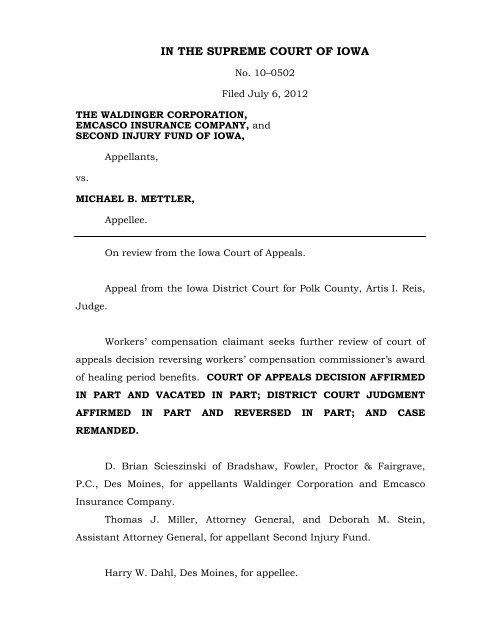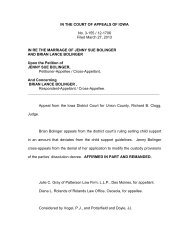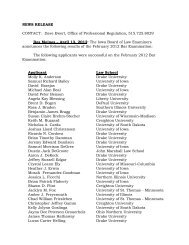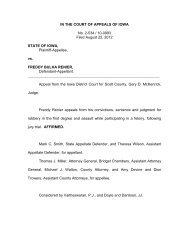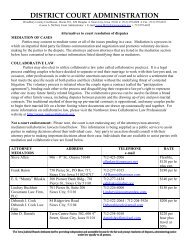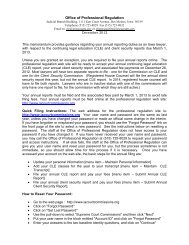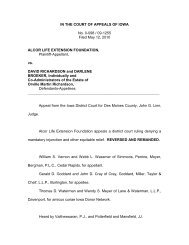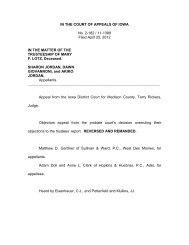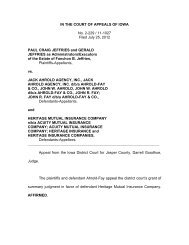No. 10–0502 - Iowa Judicial Branch
No. 10–0502 - Iowa Judicial Branch
No. 10–0502 - Iowa Judicial Branch
Create successful ePaper yourself
Turn your PDF publications into a flip-book with our unique Google optimized e-Paper software.
IN THE SUPREME COURT OF IOWA<br />
<strong>No</strong>. <strong>10–0502</strong><br />
Filed July 6, 2012<br />
THE WALDINGER CORPORATION,<br />
EMCASCO INSURANCE COMPANY, and<br />
SECOND INJURY FUND OF IOWA,<br />
vs.<br />
Appellants,<br />
MICHAEL B. METTLER,<br />
Judge.<br />
Appellee.<br />
On review from the <strong>Iowa</strong> Court of Appeals.<br />
Appeal from the <strong>Iowa</strong> District Court for Polk County, Artis I. Reis,<br />
Workers’ compensation claimant seeks further review of court of<br />
appeals decision reversing workers’ compensation commissioner’s award<br />
of healing period benefits. COURT OF APPEALS DECISION AFFIRMED<br />
IN PART AND VACATED IN PART; DISTRICT COURT JUDGMENT<br />
AFFIRMED IN PART AND REVERSED IN PART; AND CASE<br />
REMANDED.<br />
D. Brian Scieszinski of Bradshaw, Fowler, Proctor & Fairgrave,<br />
P.C., Des Moines, for appellants Waldinger Corporation and Emcasco<br />
Insurance Company.<br />
Thomas J. Miller, Attorney General, and Deborah M. Stein,<br />
Assistant Attorney General, for appellant Second Injury Fund.<br />
Harry W. Dahl, Des Moines, for appellee.
HECHT, Justice.<br />
2<br />
On further review, we are asked to determine whether <strong>Iowa</strong>’s<br />
workers’ compensation statute allows a claimant to recover healing<br />
period benefits—after he has reached maximum medical improvement<br />
and returned to substantially similar work following a work-related<br />
injury—for a period of approximately thirteen weeks of postsurgical<br />
convalescence during which he was unable to work. The workers’<br />
compensation commissioner awarded such benefits in this case, but the<br />
court of appeals reversed the award on the ground that <strong>Iowa</strong> Code<br />
section 85.34(1) (2011) does not authorize the benefits under the<br />
circumstances of this case. 1 We conclude the statute does authorize an<br />
award of healing period benefits in this case. Accordingly, we vacate that<br />
portion of the decision of the court of appeals, affirm the district court’s<br />
judgment affirming the award, and remand for further proceedings<br />
consistent with this opinion.<br />
I. Background Facts and Proceedings.<br />
Upon graduation from high school in 1969, Michael Mettler began<br />
working as a plumber. After five years, he became a journeyman<br />
plumber in 1974. He joined the Army reserves and was called to active<br />
duty in the early 1980s. While in the military service, he fell from a<br />
stepladder and landed on his elbows, breaking both upper extremities<br />
and requiring surgery. He also injured his right ankle during his service.<br />
Mettler remained on active military duty until 2001 when he received an<br />
honorable discharge.<br />
1 The commissioner’s award occurred in 2009. However, because there have<br />
been no substantive changes in chapter 85 material to our decision, we will refer to the<br />
2011 Code unless otherwise indicated.
3<br />
Mettler returned to work as a union plumber for the Waldinger<br />
Corporation. Soon after, he reported pain in his right ankle which he<br />
attributed to walking on uneven construction sites and climbing ladders<br />
and scaffolding. Mettler and Waldinger stipulated that Mettler sustained<br />
a work-related injury to his right lower extremity on August 9, 2001. In<br />
January 2002, Dr. Lee diagnosed posterior talar dome lesions and<br />
discussed with Mettler options including restricting activities,<br />
transferring to a desk job, or having surgery. Mettler opted for surgery.<br />
On February 6, 2002, Dr. Lee performed surgery which included<br />
medial malleolar osteotomy, ankle arthrotomy with excision of multiple<br />
loose bodies, repair of an OCD lesion, and an osteochondral graft.<br />
Dr. Lee’s postsurgical diagnosis included talar dome lesions, arthritis,<br />
and ankle synovitis. Mettler received some relief from the surgery and,<br />
after a period of convalescence, returned to work at Waldinger on<br />
May 10, 2002.<br />
In July 2002, Mettler saw Dr. Lee again and again reported right<br />
ankle discomfort. Dr. Lee recommended a second ankle surgery. On<br />
September 25, 2002, Dr. Lee performed arthroscopic surgery with<br />
extensive debridement of degenerative changes and synovitic tissue in<br />
Mettler’s right ankle. Dr. Lee noted significant degenerative changes<br />
during the arthroscopic procedure and predicted Mettler’s right ankle<br />
would likely get progressively worse over time. Dr. Lee released Mettler<br />
to return to work on October 11, 2002, and informed him that he had<br />
reached maximum medical improvement (MMI) on <strong>No</strong>vember 15, 2002.<br />
Dr. Lee rated Mettler’s right lower extremity permanent impairment at<br />
five percent in a letter to Waldinger’s workers’ compensation insurer on<br />
December 24, 2002.
4<br />
Mettler “turned” his ankle in February 2003 and returned to<br />
Dr. Lee. Mettler reported on this occasion that he still had significant<br />
pain and discomfort in his ankle. In October of 2003, Dr. Lee suggested<br />
a series of injections which were administered in early 2004. Mettler<br />
received little if any relief from the injections, and Dr. Lee recommended<br />
Mettler limit his physical activity on his right ankle as much as possible<br />
and informed Mettler that work in a seated position was most<br />
appropriate for him.<br />
On July 1, 2004, Dr. Lee performed a second right ankle<br />
arthroscopy with extensive debridement. Mettler responded well to this<br />
surgery and, after a healing period, returned to work for Waldinger. After<br />
seeing Mettler on April 6, 2005, Dr. Lee wrote to Waldinger expressing<br />
his opinion that he expected Mettler to experience ankle problems in the<br />
future and have worsening degenerative changes that might require<br />
ankle fusion or replacement. Dr. Lee’s letter reported that Mettler was<br />
again at maximum medical improvement and rated his permanent<br />
impairment at seven percent of the right lower extremity.<br />
Mettler again consulted Dr. Lee on June 30, 2005, with right ankle<br />
complaints, and in September 2005, Dr. Lee opined an ankle fusion or<br />
replacement were among the possible treatment options. Mettler sought<br />
an independent medical examination with Dr. Kuhnlein. Dr. Kuhnlein<br />
diagnosed osteoarthritis with chronic pain and an unstable ankle joint,<br />
concluded Mettler had reached MMI, and agreed with Dr. Lee’s prediction<br />
that Mettler would need right ankle arthrodesis in the future.<br />
Dr. Kuhnlein rated Mettler’s impairment at thirteen percent to the right<br />
lower extremity.<br />
Mettler’s employment with Waldinger ended in 2006, but he<br />
continued working as a plumber for other employers. In October of
2006, Mettler filed an original notice and petition with the <strong>Iowa</strong> Workers’<br />
Compensation Commissioner alleging a claim against Waldinger and<br />
asserting entitlement to benefits from the Second Injury Fund. 2<br />
5<br />
In July 2007, Mettler again saw Dr. Lee for ankle pain. Although<br />
Mettler inquired about an ankle replacement procedure, Dr. Lee<br />
recommended another ankle arthroscopy. On September 18, 2007,<br />
Dr. Lee performed a third ankle arthroscopy with extensive debridement<br />
of Mettler’s right ankle. He released Mettler to return to work without<br />
restrictions on December 7, 2007. In a letter written in April 2008,<br />
Dr. Lee opined that Mettler’s right ankle condition was a result of the<br />
August 9, 2001 work-related injury, rated Mettler’s impairment at fifteen<br />
percent of the right lower extremity, and recommended Mettler be<br />
restricted to sedentary work.<br />
Following a hearing and an intra-agency appeal, the commissioner<br />
found Mettler reached MMI on April 6, 2005, and awarded permanent<br />
partial disability benefits for a scheduled loss of fifteen percent of the<br />
right lower extremity with interest as provided in <strong>Iowa</strong> Code section<br />
85.30. The commissioner further ordered Waldinger to pay healing<br />
period benefits for the period from the date of the third arthroscopic<br />
surgery, September 18, 2007, until Mettler returned to work as a<br />
plumber on December 7, 2007. The commissioner also found Mettler<br />
had sustained an industrial disability of fifteen percent for which the<br />
Second Injury Fund owed benefits under <strong>Iowa</strong> Code section 85.64.<br />
2 Mettler’s claim against the Second Injury Fund under <strong>Iowa</strong> Code section 85.64<br />
alleged prior injuries to his left knee, left elbow, and right knee as qualifying prior<br />
losses. Waldinger’s answer alleged that Mettler’s lower extremity disability, if any,<br />
should be apportioned so that only disability attributable to the work-related injury<br />
would be allocated to Waldinger.
6<br />
Waldinger filed a petition for judicial review contending the<br />
commissioner erred in awarding healing period benefits following the<br />
September 2007 surgery, in finding fifteen percent disability to Mettler’s<br />
right lower extremity, and in failing to apportion Mettler’s lower extremity<br />
disability under <strong>Iowa</strong> Code section 85.34(7) to account for the fact that<br />
Mettler had lost part of the use of his right leg before he began working<br />
for Waldinger. Mettler filed a cross-petition for judicial review requesting<br />
his claim against the Second Injury Fund be remanded to the agency on<br />
the ground that the agency miscalculated and understated his loss of<br />
earnings as a factor in the assessment of industrial disability for<br />
purposes of the award against the Second Injury Fund. The district<br />
court affirmed the commissioner’s award for lower extremity disability<br />
and rejected Waldinger’s contention that the disability should be<br />
apportioned. The court also affirmed the award of healing period<br />
benefits, but remanded the Second Injury Fund claim to the agency for<br />
further proceedings as Mettler requested.<br />
Waldinger and the Second Injury Fund appealed the district<br />
court’s ruling, and we transferred the appeal to the court of appeals. The<br />
court of appeals affirmed the commissioner’s determination that<br />
Waldinger was liable for the entirety of Mettler’s lower extremity disability<br />
but reversed the district court’s rulings remanding the industrial<br />
disability claim against the Second Injury Fund and awarding healing<br />
period benefits. Mettler filed an application urging us to review the two<br />
issues which were reversed by the court of appeals. We granted further<br />
review, however, to decide only whether the commissioner correctly<br />
interpreted <strong>Iowa</strong> Code section 85.34(1) to allow an award of healing<br />
period benefits for a period of disability commencing on September 18,<br />
2007, the date of Mettler’s last surgery, until December 7, 2007, when he
eturned to work as a plumber. We vacate the decision of the court of<br />
appeals on the healing period issue and affirm the district court’s<br />
judgment affirming the commissioner’s award of healing period benefits<br />
under section 85.34(1). As our further review does not address them, the<br />
decision of the court of appeals on all other matters raised in this appeal<br />
shall be final.<br />
II. Scope of Review.<br />
7<br />
Mettler’s claim for healing period benefits turns on whether the<br />
workers’ compensation commissioner properly interpreted <strong>Iowa</strong> Code<br />
section 85.34(1). This court has previously concluded in several cases<br />
that the legislature did not grant the commissioner authority to interpret<br />
chapter 85. See Finch v. Schneider Specialized Carriers, Inc., 700 N.W.2d<br />
328, 330 (<strong>Iowa</strong> 2005); Mycogen Seeds v. Sands, 686 N.W.2d 457, 464<br />
(<strong>Iowa</strong> 2004). However, we recently explored the analytical framework for<br />
determining on judicial review the extent to which we give deference to<br />
an agency’s interpretations of law. See Renda v. <strong>Iowa</strong> Civil Rights<br />
Comm’n, 784 N.W.2d 8, 10 (<strong>Iowa</strong> 2010). Under the Renda framework,<br />
our review of an agency’s interpretation of a statutory provision depends<br />
on whether the legislature has clearly vested the agency with<br />
discretionary authority to interpret the particular statutory provision. Id.<br />
As we have not yet applied to section 85.34(1) the analytical framework<br />
announced in Renda, we must consider the question of the extent to<br />
which, if at all, the commissioner’s interpretation of section 85.34(1) is<br />
entitled to deference on judicial review.<br />
The legislature’s vesting of authority in an agency to interpret a<br />
statute need not be expressed and may be found upon “an examination<br />
of the phrases or statutory provisions to be interpreted, their context, the<br />
purpose of the statute, and other practical considerations.” Id. at 11.
Our inquiry “must always involve an examination of the specific<br />
statutory language at issue, as well as the functions of and duties<br />
imposed on the agency.” Id. at 12. In the absence of explicit guidance<br />
from the legislature, it is usually inappropriate to determine whether an<br />
agency has authority to interpret an entire statute. Id. at 13.<br />
“Accordingly, broad articulations of an agency’s authority, or lack of<br />
authority, should be avoided in the absence of an express grant of broad<br />
interpretive authority.” Id. at 14. Thus, our conclusions in prior cases<br />
that the legislature granted the commissioner no authority to interpret<br />
<strong>Iowa</strong> Code chapter 85, see, e.g., Mycogen Seeds, 686 N.W.2d at 464, were<br />
overbroad and are incompatible with the new analytical framework<br />
announced in Renda.<br />
8<br />
The legislature has granted to the commissioner the authority to<br />
“[a]dopt and enforce rules necessary to implement” chapters 85, 85A,<br />
85B, 86 and 87. <strong>Iowa</strong> Code § 86.8(1)(a). This legislative grant of broad<br />
rulemaking authority is relevant to our determination of whether<br />
interpretive discretion has been vested in the commissioner pertaining to<br />
section 85.34(1), but it is not conclusive. Compare City of Marion v. <strong>Iowa</strong><br />
Dep’t of Revenue & Fin., 643 N.W.2d 205, 207 (<strong>Iowa</strong> 2002) (finding<br />
agency vested with authority to promulgate rules “necessary and<br />
advisable for its detailed administration” had discretion to interpret the<br />
term “athletic sport,” a term not defined in the statute), with <strong>Iowa</strong> Land<br />
Title Ass’n v. <strong>Iowa</strong> Fin. Auth., 771 N.W.2d 399, 402 (<strong>Iowa</strong> 2009)<br />
(concluding the legislature’s delegation to the <strong>Iowa</strong> Finance Authority of<br />
the authority to adopt rules “necessary for the implementation of the title<br />
guaranty program” did not clearly vest the agency with authority to<br />
interpret the terms “hardship” and “public interest” in <strong>Iowa</strong> Code section<br />
16.91(5)). After surveying this court’s decisions in these cases and
others, we noted in Renda that our determination of whether the<br />
legislature has clearly vested interpretive authority in an agency turns<br />
not merely on a grant of broad rulemaking power, but on other case-<br />
specific factors as well. Renda, 784 N.W.2d at 13–14. We must look<br />
carefully “at the specific language the agency has interpreted as well as<br />
the specific duties and authority given to the agency with respect to<br />
enforcing particular statutes.” Id. at 13.<br />
9<br />
If we conclude authority has clearly been vested in the<br />
commissioner for the interpretation of a statutory provision, we will<br />
affirm the commissioner’s interpretation unless it is “[b]ased upon an<br />
irrational, illogical, or wholly unjustifiable interpretation.” <strong>Iowa</strong> Code<br />
§ 17A.19(10)(l). If, however, the commissioner has not been vested with<br />
the authority to interpret the provision, we will accord no deference to<br />
the commissioner’s interpretation. Id. § 17A.19(10)(c); see also Neal v.<br />
Annett Holdings, Inc., 814 N.W.2d 512, 519 (<strong>Iowa</strong> 2012) (according no<br />
deference to commissioner’s interpretation because the legislature did<br />
not grant the commissioner authority to interpret the term “suitable<br />
work” under <strong>Iowa</strong> Code section 85.33(3)).<br />
III. Discussion.<br />
<strong>Iowa</strong> Code section 85.34(1) provides:<br />
Healing Period. If an employee has suffered a personal<br />
injury causing permanent partial disability for which<br />
compensation is payable as provided in subsection 2 of this<br />
section, the employer shall pay to the employee<br />
compensation for a healing period, as provided in section<br />
85.37, beginning on the first day of disability after the injury,<br />
and until the employee has returned to work or it is<br />
medically indicated that significant improvement from the<br />
injury is not anticipated or until the employee is medically<br />
capable of returning to employment substantially similar to<br />
the employment in which the employee was engaged at the<br />
time of injury, whichever occurs first.
<strong>Iowa</strong> Code § 85.34(1).<br />
10<br />
Waldinger contends the commissioner erred in interpreting section<br />
85.34(1) as allowing an award to Mettler of healing period benefits for a<br />
period of postsurgical convalescence that occurred after he reached MMI 3<br />
on April 6, 2005, or returned to substantially similar work. Put another<br />
way, Waldinger contends the proper interpretation of the statute does not<br />
authorize the commissioner to order the resumption of healing period<br />
benefits for approximately thirteen weeks during which Mettler was<br />
unable to work as a consequence of the surgery performed on<br />
September 18, 2007, because he had previously returned to<br />
substantially similar work and reached MMI.<br />
Mettler takes a different view of the statute, contending the<br />
commissioner correctly interpreted section 85.34(1) as allowing for the<br />
possibility of more than one healing period following a work-related<br />
injury. Mettler contends the commissioner correctly interpreted the<br />
statute as allowing a resumption of the healing period when, after<br />
multiple surgeries, periods of convalescence, returns to work, and ratings<br />
of permanent impairment by medical providers, a claimant again<br />
becomes temporarily disabled from work as a consequence of ordinary<br />
and necessary surgical treatment for the work-related injury.<br />
3 “MMI” is a term of art commonly used by the commissioner, attorneys<br />
practicing in the field of workers’ compensation law, and medical providers expressing<br />
opinions affecting claimants’ entitlement to healing period benefits and permanent<br />
partial disability benefits under <strong>Iowa</strong> Code section 85.34. The term is used as an<br />
alternative means of expressing the point at which “it is medically indicated that<br />
significant improvement from the injury is not anticipated.” <strong>Iowa</strong> Code § 85.34(1). A<br />
treatise on <strong>Iowa</strong> workers’ compensation law uses “maximum recuperation” as an<br />
alternative moniker for the MMI concept. See 15 James R. Lawyer, <strong>Iowa</strong> Practice Series:<br />
Workers’ Compensation, § 13:3, at 135 (2011).
11<br />
To resolve the issue, we must first determine whether the<br />
legislature clearly vested in the commissioner the authority to interpret<br />
the phrase<br />
Id.<br />
the employer shall pay to the employee compensation for a<br />
healing period . . . beginning on the first day of disability<br />
after the injury, and until the employee has returned to work<br />
or it is medically indicated that significant improvement from<br />
the injury is not anticipated or until the employee is<br />
medically capable of returning to employment substantially<br />
similar to the employment in which the employee was<br />
engaged at the time of the injury.<br />
A. Commissioner’s Authority to Interpret <strong>Iowa</strong> Code Section<br />
85.34(1). <strong>Iowa</strong> Code chapter 85 authorizes a range of benefits for a<br />
worker who sustains a permanent partial disability in the course and<br />
scope of his employment. Among these are health care benefits for the<br />
treatment of the injury under section 85.27; healing period benefits<br />
sustaining the injured employee during convalescence and disability<br />
from work under section 85.34(1); and permanent partial disability<br />
benefits under section 85.34(2)(a–t) for “scheduled” losses and section<br />
85.34(2)(u) for all other injuries resulting in permanent partial disability.<br />
The legislature has expressly delegated to the commissioner the<br />
duty to implement and enforce these remedies against employers for<br />
injuries sustained by their employees in the course and scope of<br />
employment. See id. §§ 86.8(1)(a), 85.20. Under the Renda analysis,<br />
however, our inquiry requires us to determine whether the legislature<br />
nonetheless clearly granted the commissioner authority to interpret<br />
section 85.34(1). Renda, 784 N.W.2d at 11–12.<br />
In Office of Consumer Advocate v. <strong>Iowa</strong> Utilities Board, we<br />
concluded the legislature’s directive to “adopt rules prohibiting an<br />
unauthorized change in telecommunication service” evidenced a clear
vesting of authority in the <strong>Iowa</strong> Utilities Board to interpret the<br />
unauthorized-change-in-service provisions in section 476.103. 744<br />
N.W.2d 640, 643 (<strong>Iowa</strong> 2008); see also Evercom Sys., Inc. v. <strong>Iowa</strong> Utils.<br />
Bd., 805 N.W.2d 758, 762–63 (<strong>Iowa</strong> 2011). We find no similar express<br />
statutory grant of interpretive authority to the commissioner pertaining<br />
to the commencement and termination of a healing period under section<br />
85.34(1).<br />
12<br />
Section 85.34(1) leaves undefined several statutory terms and<br />
phrases including “a healing period,” “disability,” “return[] to work,”<br />
“significant improvement from the injury,” and “employment<br />
substantially similar.” Although the commissioner is expressly directed<br />
to “[a]dopt and enforce rules necessary to implement” chapter 85, this<br />
directive standing alone did not constitute a clear vesting of interpretive<br />
authority. <strong>Iowa</strong> Land Title, 771 N.W.2d at 402. Having reviewed the<br />
language of the statute and considered the specific duties and authority<br />
given to the commissioner under the provision, we are not persuaded<br />
that the legislature clearly vested in the commissioner interpretive<br />
authority for section 85.34(1). Accordingly, our review of the<br />
commissioner’s interpretation of section 85.34(1) is for correction of<br />
errors at law. NextEra Energy Res., LLC v. <strong>Iowa</strong> Utils. Bd., 815 N.W.2d<br />
30, 37 (<strong>Iowa</strong> 2012).<br />
B. Review of the Commissioner’s Interpretation of Section<br />
85.34(1). The court of appeals decision reversing the commissioner’s<br />
award of healing period benefits to Mettler for the period following the<br />
2007 surgery relied on language from our decision in Ellingson v.<br />
Fleetguard, Inc., 599 N.W.2d 440 (<strong>Iowa</strong> 1999). In that case, Ellingson<br />
sought healing period benefits for times she was unable to work based on<br />
a “retrogression” of her disability at times after the commissioner found
she had reached MMI. Ellingson, 599 N.W.2d at 447. Rejecting<br />
Ellingson’s claim for additional healing period benefits for times after the<br />
date upon which the commissioner found she had reached MMI, we said:<br />
13<br />
In contrast, once it has been established through a decision<br />
of the commissioner or a reviewing court that further<br />
significant improvement is not anticipated, all temporary<br />
disability benefits from a single injury are finally terminated<br />
to be followed by any permanent partial disability benefit<br />
payments that are established by the commissioner’s order.<br />
Id. We now conclude our interpretation in Ellingson of section 85.34(1)<br />
as a categorical prohibition of an award of healing period benefits for<br />
disability from work occurring after the date MMI has been achieved was<br />
erroneous, and we therefore overrule it.<br />
Our decision today acknowledges that section 85.34(1) makes<br />
provision for “a healing period.” Relying on our decision in Ellingson and<br />
reading the article “a” in the statute literally, the court of appeals<br />
concluded that Mettler was not entitled to another healing period for the<br />
time he was temporarily totally disabled from work following the<br />
September 2007 surgery. We now conclude the article “a” in the phrase<br />
“a healing period” was not intended by the legislature to limit healing<br />
period benefits to a single period of temporary disability per injury. In<br />
other contexts, we have found the article “a” to be unclear.<br />
“A” means “one” or “any,” but less emphatically than either.<br />
It may mean one where only one is intended, or it may mean<br />
any one of a great number. It is placed before nouns of the<br />
singular number, denoting an individual object or quality<br />
individualized.<br />
The article “a” is not necessarily a singular term; it is often<br />
used in the sense of “any” and is then applied to more than<br />
one individual object. . . . [T]he meaning depends on<br />
context.<br />
Voss v. <strong>Iowa</strong> Dep’t of Transp., 621 N.W.2d 208, 211 (<strong>Iowa</strong> 2001) (internal<br />
quotations marks and citation omitted). As used in the context of section
85.34(1), we conclude the legislature intended “a” to express the sense of<br />
“any.”<br />
14<br />
When, after achieving MMI, a claimant is rendered temporarily<br />
disabled from work, as Mettler was, as a consequence of surgical<br />
treatment provided under section 85.27 for a work-related injury, a new<br />
healing period begins under section 85.34(1). Our suggestion to the<br />
contrary in Ellingson was flawed for two reasons. First, it diminished the<br />
promise of continuing medical care for work-related injuries under<br />
section 85.27 by eliminating the healing period remedy intended to<br />
replace wages lost during convalescence from ordinary and necessary<br />
treatment in scenarios presenting more than one period of temporary<br />
disability from work following a single injury. Further, it ignored the fact<br />
that a single injury can cause a new period of temporary disability even<br />
after a claimant has achieved MMI.<br />
The employer’s obligation to provide medical treatment under<br />
section 85.27 for work-related injuries is not limited to the duration of a<br />
healing period. See 15 James R. Lawyer, <strong>Iowa</strong> Practice Series: Workers’<br />
Compensation, § 15:1, at 182–83 (2011) [hereinafter Lawyer]. As in<br />
Mettler’s case, an injured employee’s need for ongoing medical care<br />
sometimes extends well beyond the duration of an initial period of<br />
convalescence and becomes manifest after a return to work or after<br />
periods of work interrupted by physician-directed time off work. On<br />
occasion, as in Mettler’s case, an authorized treating physician<br />
prescribes and provides surgical treatment after the injured employee<br />
has returned to work or was thought to have achieved MMI. We see no<br />
principled reason why Mettler, or any similarly situated claimant, should<br />
be disqualified from a healing period remedy when ordinary and<br />
necessary medical care for a work-related injury temporarily removes
them again from the work force. 4 The commissioner’s interpretation of<br />
section 85.34(1) allowing a new healing period for a new period of<br />
disability during Mettler’s convalescence from the 2007 surgery,<br />
notwithstanding the 2005 MMI date, correctly recognized that, at least<br />
until Mettler’s claim is time-barred, the availability of a healing period<br />
remedy turned on whether a new period of disability from work caused<br />
by the August 9, 2001 injury began on the day of the September 18,<br />
2007 surgery.<br />
15<br />
Among the alternative markers of the end of the healing period is<br />
the phrase “the employee has returned to work.” Certainly, some<br />
attempts to return to work are unsuccessful and temporary. “Where the<br />
language is of doubtful meaning, or where an adherence to the strict<br />
letter would lead to injustice, to absurdity, or to contradictory provisions,<br />
the duty of ascertaining the true meaning devolves upon the court.”<br />
Case v. Olson, 234 <strong>Iowa</strong> 869, 872, 14 N.W.2d 717, 719 (1944); accord 2A<br />
<strong>No</strong>rman J. Singer & J.D. Shambie Singer, Statutes and Statutory<br />
Construction § 45:12, at 101 (7th ed. 2007) (“It is fundamental, however,<br />
that departure from the literal construction of a statute is justified when<br />
such a construction would produce an absurd and unjust result and<br />
would clearly be inconsistent with the purposes and policies of the act in<br />
question.”). Our interpretation of section 85.34(1) announced today<br />
avoids the absurd and unjust result that would arise if the statute were<br />
interpreted to allow only one course of healing period benefits for a single<br />
injury. We cannot conclude the legislature intended to deny additional<br />
4 As this appeal proceeds from an agency arbitration decision, we do not address<br />
whether a claimant’s access to a healing period remedy for an injury ends as a matter of<br />
law with the expiration of the limitations period for filing a review reopening proceeding<br />
under <strong>Iowa</strong> Code section 85.26(2).
healing period benefits when an injured employee’s return to work proves<br />
unsuccessful and a new period of temporary disability from work begins<br />
or—as in Mettler’s case—invasive medical treatment for the work-related<br />
16<br />
injury again renders him temporarily disabled from work.<br />
Among the other indicators of the end of a healing period is the<br />
employee’s achievement of MMI. Characterized by the legislature as that<br />
point in the convalescence from which “it is medically indicated that<br />
further significant improvement from the injury is not anticipated,”<br />
section 85.34(1) leaves room for the possibility that continuing medical<br />
treatment provided by the employer under section 85.27 can result in a<br />
series of intermittent invasive treatments, periods of temporary disability<br />
from work and convalescence, serial MMI dates, and revised permanent<br />
disability ratings following a single work-related injury.<br />
Furthermore, our interpretation of the statutory provision is<br />
consistent with our long-standing principle of construction of the<br />
workers’ compensation statute. The workers’ compensation statute was<br />
adopted “for the benefit of the working [person] and should be, within<br />
reason, liberally construed.” Barton v. Nevada Poultry Co., 253 <strong>Iowa</strong> 285,<br />
289, 110 N.W.2d 660, 662 (1961). Our interpretation of section 85.34(1)<br />
also notably conforms to the commissioner’s long-standing interpretation<br />
of section 85.34(1) in cases involving intermittent periods of disability<br />
from work following a work-related injury. See 15 Lawyer, § 13:3, at<br />
138–39 (“Healing period for an injury may terminate and then begin<br />
again.”). Accordingly, we conclude the commissioner correctly<br />
interpreted section 85.34(1) as allowing a new course of healing period<br />
benefits during Mettler’s temporary disability from work following surgery<br />
from September 18 through December 7, 2007, notwithstanding his prior
eturns to work and earlier achievements of MMI following previous<br />
surgeries performed in the treatment of a single work-related injury.<br />
17<br />
The court of appeals also concluded the commissioner’s award of<br />
healing period benefits must fail because the record contained no<br />
evidence supporting a finding that Mettler’s “doctors anticipated<br />
reasonable improvement from the [2007 surgery].” As we affirm in this<br />
case the commissioner’s interpretation of section 85.34(1) allowing an<br />
award of healing period benefits for a new period of disability beginning<br />
after the claimant reached MMI under the circumstances presented here,<br />
we need not address whether the record supports a finding that<br />
significant improvement was anticipated from the 2007 surgery. 5 The<br />
dispositive question is whether the treatment provided to Mettler under<br />
section 85.27 resulted in a new period of disability from work during the<br />
period of convalescence at a time before the claim for benefits for the<br />
injury of August 9, 2001, was time-barred. It clearly did.<br />
IV. Conclusion.<br />
We vacate only that part of the decision of the court of appeals<br />
reversing the award of healing period benefits. The disposition by the<br />
court of appeals of all other issues raised on appeal is affirmed.<br />
COURT OF APPEALS DECISION AFFIRMED IN PART AND<br />
VACATED IN PART; DISTRICT COURT JUDGEMENT AFFIRMED IN<br />
PART AND REVERSED IN PART; AND CASE REMANDED.<br />
All justices concur except Waterman, J., who concurs specially and<br />
Mansfield, J., who takes no part.<br />
5 It seems to us a reasonable inference, however, that the surgeon who performed<br />
the 2007 surgery anticipated some improvement in the injured ankle as a consequence<br />
of the treatment.
18<br />
WATERMAN, Justice (concurring specially).<br />
#<strong>10–0502</strong>, Waldinger Corp. v. Mettler<br />
I respectfully specially concur. I agree with the majority’s outcome<br />
because it is consistent with the workers’ compensation commissioner’s<br />
interpretation of <strong>Iowa</strong> Code section 85.34(1) (2011). My adherence to<br />
stare decisis precludes me from joining the full opinion. This decision<br />
turns on the interpretation of a term of art—“healing period”—that is<br />
unique to the workers’ compensation law administered by the<br />
commissioner. The majority interprets that language itself without<br />
acknowledging the agency’s interpretive authority or the deference owed<br />
to its interpretation of that specialized term within its expertise. See<br />
Renda v. <strong>Iowa</strong> Civil Rights Comm’n, 784 N.W.2d 8, 11–12 (<strong>Iowa</strong> 2010). I<br />
would apply Renda and defer to the agency’s interpretation of the<br />
healing-period provision to reach the same result.


